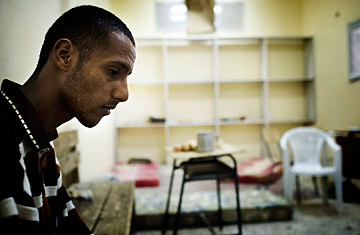
Omar, a soldier in the well-trained and widely feared private battalion of Gaddafi's son Khamis, held in captivity in Shahat on February 28, 2011.
(2 of 2)
And despite the tough treatment, his job, by Libyan standards, was better than most. He got paid 700 Dinars a month — a sizable income in a country where most government employees make between 200 and 300 Dinars. And it's significant for a man from a poor family, helping to support a mother, a disabled father, and six siblings. When asked about his politics, he shrugs again and smiles weakly: "You can't help but be pro-Gaddafi because he's so frightening." It's a statement that many opposition members would agree with.
Then again, Omar adds that the income collected by Khamis' battalion soldiers is around double the income that others soldiers in the country make. That's because Khamis' is a special force. "It's Khamis' personality and he likes to be special," Omar says. He has never met the man, and he has no idea how many soldiers make up the force; he estimates in the hundreds.
As Omar tells it: the day after he arrived at the base in al-Baida, a group of minibuses came to transport him and 70 others into town for a protest. He claims to be one of nine who didn't make it onto the bus — there wasn't enough room — and he was forced to stay behind. When fighting between those on the base and those outside ensued, he says he never picked up a gun, but those around him did. Later, after a three-day firefight, 70 men surrendered when the rebels overran the base and a "sheikh" outside told them to come out and give up. This was a different 70 from the men he arrived with, Omar says; many of his fellow captives were men flown in from Sabha. Says he, "Whoever went in the bus [that first day] to the protest never came back."
He claims to be incredulous that there would be so much violence. "We didn't know why they asked us to surrender. I still don't know. We were both Libyans on each side [of the firefight], and we didn't know what side we were on. We were afraid to go out because we are dark-skinned and we thought they would think we're mercenaries and attack us. When the people started attacking the base, some [inside the base] went to the weapons' storage and started fighting back. I think this was Gaddafi's plan — to bring black people to the east so that people would start killing each other and that would start a tribal civil war."
By releasing their 200 captives, the Shahat residents say they have helped to preempt such an event. But they're also not convinced the threat has passed. At an al-Baida town administrative building that has been commandeered by the rebels, several armed men — one in a black ski mask — stand guard; all cradling rifles. They have two new prisoners inside; both are members of the Tuareg tribe from the southern Libyan Sahara. They were captured on Monday Feb. 28.
Both men claim to be laborers, but who can be sure, Esbak says; they are now being interrogated. For days, residents here have been picking up anyone who looks or sounds foreign or has a darker skin tone. They identify suspects "by the accent; the way they dress and talk; if they're scared," he says. "Some of them have tattoos that say 'My mother and my father are Muammar'" — a marking typically associated with orphans who have been abducted and raised by the regime to work as soldiers, Esbak adds.
Indeed there are still rumors circulating in this green, mountainous region of Libya's east that many of the regime fighters put down their weapons and assumed a civilian posture as soon as the region turned in favor of the rebels; disappearing into the surrounding forests and towns. Some immediately pretended to be farmers or laborers, the townspeople say.
Esbak has personally arrested and released a number of individuals in recent days. But: "Even those five Chadians," he says of the five who were held at the Aruba School, "We're not sure they were mercenaries." But no one is sure where they are. The men at the school say the five were transferred somewhere because there were no relatives to pick them up. But in town, no one seems to know what exactly has happened to them.
On Monday afternoon, Omar's grandmother and cousin are waiting in a parked car next to a mosque in the center of al-Baida. They have driven two-and-a-half hours from Benghazi to pick him up, and his grandmother starts to cry when she sees him. Omar hugs them both, comforting his grandmother.
Esbak holds up a camera phone to record a quick video of Omar. "OK?" he asks him, "Anyone treat you badly? No." His cousin is handed a release paper to fill out and sign. It reads: "I declare that I received ____ prisoner in Shahat and my relation to him is _____. And I declare that he is in good health and I assume full responsibility for him."
Omar is the last of the 200 to be released from the Aruba School, but not the last man to be detained as mercenary phobia continues to sweep the east. "After what happened here, we lost faith in every black guy that's walking around," says one soldier in Benghazi. "So especially if he doesn't have a passport, we just grab him." The soldier stands guard over three Chadian detainees at the Military Accounting Office in Benghazi, which has quickly become the opposition's capital. The men are all young and frightened. One, named Idriss, had a Chadian ID that identifies him as a farmer.
With reporting by Andrew Lee Butters / Benghazi
